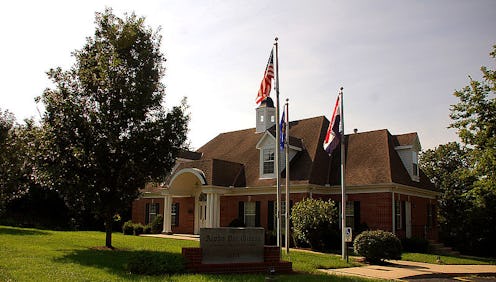
On Thursday, the national office of the Alpha Phi sorority issued a statement announcing why it doesn't support the Safe Campus Act. While a bill surrounding campus sexual assault might sound like a good thing, the legislation is surprisingly controversial, and Alpha Phi makes a lot of good points about some of its provisions. Alpha Phi doesn't support the Safe Campus Act because it doesn't allow colleges to investigate assault cases that aren't reported to law enforcement officials in addition to being reported to the school. Alpha Phi is the first of the sororities in the National Panhellenic Conference to announce that it won't support the bill.
In a statement, Alpha Phi wrote that "our sisters who are survivors should have choices in how, when and to whom they go to for support or to report the crime." The sorority's national office added that assault victims "should have their own voice and the support and encouragement they need to move forward including reporting as they choose to." The sorority told the Huffington Post that a number of Alpha Phi chapters and members asked the national office to clarify that the sorority as a whole doesn't support the bill, though individual chapters can choose to do so. The Alpha Phi statement also specified that the sorority has not given financial support to the proposed legislation.
For now, at least, Alpha Phi is alone in its stance on the bill. The North American Interfraternity Conference and the National Panhellenic Conference have both advocated for the legislation. The Safe Campus Act was first presented in the House of Representatives on July 29, and it was sponsored by Reps. Matt Salmon (R-Ariz.), Kay Granger (R-Texas), and Pete Sessions (R-Texas). According to the bill's language, the Safe Campus Act was created "to amend the Higher Education Act of 1965 to protect victims of sexual violence" and to "improve the adjudication of allegations related to sexual violence." But many advocates for victims of sexual assault fear the legislation will do the opposite, because it could prevent colleges from looking into assault cases that aren't reported to law enforcement.
A number of legislators don't support the Safe Campus Act, either — Democratic Sens. Kirsten Gillibrand of New York and Claire McCaskill of Missouri have spoken out against the bill. The senators also criticized the National Panhellenic Conference for lobbying in favor of the Safe Campus Act. Gillibrand and McCaskill, who were both members of sororities, co-sponsored the Campus Accountability and Safety Act, a bill they feel is a better proposal than the Safe Campus Act for responding to campus sexual assault.
Proponents of the Safe Campus Act argue that it would create streamlined guidelines for how colleges should respond to sexual assault allegations. The Campus Accountability and Safety Act would also do so as well, by making schools nominate a "confidential advisor" for victims of sexual assault. Gillibrand and McCaskill's bill would also force colleges to " make their disciplinary proceedings conform to nationwide standards" and "solidify jurisdiction and division of responsibilities with local law enforcement," explains Slate's Christina Cauterucci.
"The goal of any campus sexual assault legislation should be to encourage survivors to report the crime so that schools and law enforcement can be better equipped and able to fight it," Gillibrand told Slate in October. "The sexual assault bill that was introduced in the House does exactly the opposite." Like many advocates for sexual assault victims, Gillibrand believes the bill would discourage victims from reporting sexual assault. Cauterucci notes that campuses have an obligation to make students feel safe for survivors, and to prevent sexual assaults, while law enforcement agencies don't have that obligation.
In addition to Gillibrand and McCaskill, many advocacy groups for victims of sexual assault have also denounced the Safe Campus Act. Two hundred and twenty groups, including the YWCA USA and several chapters of the National Organization for Women (NOW), wrote an open letter to the House of Representatives earlier this month, arguing that the Safe Campus Act would "make campuses less safe for survivors."
Under the federal gender equity law Title IX, colleges are required to respond to every sexual harassment or assault report on campus. Many advocates believe that requiring victims to report these incidents to police would make them less likely to report the assaults at all. As RH Reality Check explains, students who are assaulted by friends or partners may not want to turn them in to the police. Or, students who've been sexually assaulted may not want to undergo the process of reporting the incident to law authorities and going through a public trial. In such cases, the Safe Campus Act would do more harm than good for the victims.
Image: Wikimedia Commons